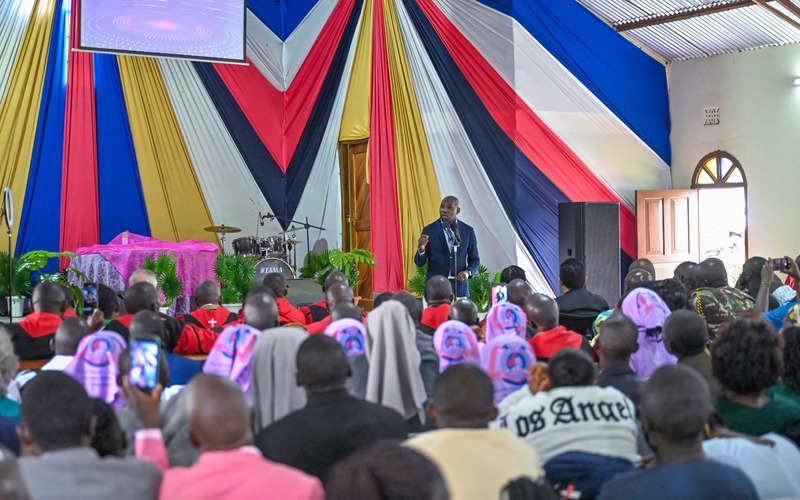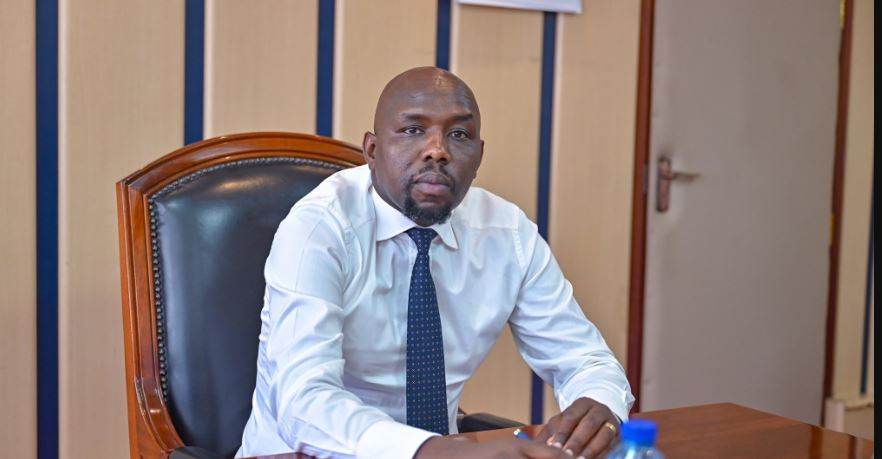Interior CS Murkomen links Gen Z's online activism to drug abuse, mental illnesses

According to Murkomen, substance abuse has "extremely destroyed" the lot who have resorted to insulting people online as a coping mechanism.
The government has resorted to blaming alcohol and drugs for Gen Z’s hateful messages on social media, particularly the “Ruto must go” campaign, which has gained momentum among Kenyan youth.
Interior Cabinet Secretary Kipchumba Murkomen cautioned young people against misusing social media, warning that online discourse could destabilise the country.
More To Read
His remarks come amid an ongoing debate over last week's comments by Chief of Defence Forces General Charles Kahariri on the “Ruto must go” campaign.
General Kahariri, alongside National Intelligence Service (NIS) Director General Noordin Haji, condemned the campaign, which has been active since last year’s protests against President William Ruto’s government. Their statements drew criticism from various quarters, with concerns raised over their involvement in political affairs.
Various Kenyans, including political leaders, argued that the military should remain neutral and refrain from commenting on political matters. Former Deputy President Rigathi Gachagua stated that the military should remain apolitical and warned Kahariri against involving the military in political affairs.
He argued that the “Ruto Must Go” chants represent a call for change through constitutional means, specifically targeting the 2027 General Elections.
However, speaking at the African Inland Church in Makutano, Meru, on Sunday, Murkomen defended Kahariri and Noordin, urging the youth to heed their warnings and focus on maintaining national stability.
“Those two gentlemen are speaking from information and are warning you about the future of your country. You are making social media arguments here and there,” Murkomen said.
“The future of a country needs order; otherwise, we will be in the same situation with our neighbours, sitting in refugee camps.”
He reiterated Kahariri’s stance on the constitutional process of removing leaders from office, emphasising that due legal channels should be followed.
“During elections, there is how to remove someone from office. There is also impeachment and jails if someone breaks the law,” he said.
The Interior CS raised concerns over the moral fabric of the current generation, arguing that they enjoy too much freedom.
𝐖𝐎𝐑𝐒𝐇𝐈𝐏 𝐀𝐍𝐃 𝐀𝐍𝐍𝐈𝐕𝐄𝐑𝐒𝐀𝐑𝐘 𝐂𝐄𝐋𝐄𝐁𝐑𝐀𝐓𝐈𝐎𝐍- 𝐀𝐈𝐂 𝐌𝐀𝐊𝐔𝐓𝐀𝐍𝐎, 𝐍𝐎𝐑𝐓𝐇 𝐈𝐌𝐄𝐍𝐓𝐈
— KIPCHUMBA MURKOMEN, E.G.H (@kipmurkomen) March 30, 2025
𝐖𝐞 𝐦𝐮𝐬𝐭 𝐜𝐨𝐦𝐞 𝐭𝐨𝐠𝐞𝐭𝐡𝐞𝐫 𝐚𝐬 𝐚 𝐬𝐨𝐜𝐢𝐞𝐭𝐲 𝐚𝐧𝐝 𝐜𝐨𝐧𝐟𝐫𝐨𝐧𝐭 𝐭𝐡𝐞 𝐚𝐥𝐜𝐨𝐡𝐨𝐥 𝐚𝐧𝐝 𝐬𝐮𝐛𝐬𝐭𝐚𝐧𝐜𝐞 𝐚𝐛𝐮𝐬𝐞 𝐦𝐞𝐧𝐚𝐜𝐞… pic.twitter.com/H6kjradFFo
According to Murkomen, substance abuse has "extremely destroyed" the lot who have resorted to insulting people online as a coping mechanism.
"Most of these young people posting hateful messages on social media are battling mental health challenges brought on by drug abuse and alcohol abuse," he said, urging parents to instill discipline in their children.
“Let us go to our homes and talk to our children. If you have come to church here, your Christianity on Sunday is meaningless if you do not have Bible study with your children at home, pray with them at home, and talk to your children.”
Murkomen’s comments have now sparked widespread debate online, with many young Kenyans expressing frustration over unemployment and economic hardships.
Youths took to the social media platform X to voice their discontent, accusing the government of deflecting blame instead of addressing the root causes of their struggles. Many argued that high unemployment rates, corruption, and economic mismanagement—not drug use—are the real reasons behind their frustrations and online activism.
“Somebody tell Murkomen that youths are struggling with mental health due to unemployment and lack of money. To curb that, many resort to drugs. I will never judge someone who stays home all day. Been there,” Kimuzi, an X user, wrote.
Another user, George Banks, criticised the government’s response, saying, “The mental health crisis plaguing Kenyans is not a byproduct of substance abuse but a direct consequence of the systematic looting of public resources—funds meant to uplift the very citizens now left in despair. For Murkomen to deride the youth for their struggles, insinuating they lack the discipline to step out and seek opportunities, is the height of political gaslighting.”
Others pushed back against Murkomen’s remarks, highlighting the disconnect between the government and ordinary Kenyans.
“Our brother Murkomen shouldn’t, in his capacity as CS, utter such a statement. Those are scripts meant to be read by someone from the street, not by someone who survives on public resources. Note that individuals who smoke bhang and work as content creators pay taxes, which then support our honorable brothers and sisters’ extravagant lifestyles. Those taxpayers deserve respect regardless of what they smoke,” X user Chaguas1 wrote.
“Murkomen thinks Kenyan youth have mental health issues because we’re activists online. Not the joblessness, not the corruption, not the economy in ICU—nope, it’s the WiFi causing depression. Maybe if we all delete Twitter, rent will start paying itself?” Mathew Kevin Jnr said.
Others questioned why the government was blaming youth for their struggles instead of tackling corruption and economic mismanagement.
“Politicians are the ones struggling with mental health issues. What explains fools who lie, live opulently, steal and donate to churches and mosques, insist SHA is working, oversee the death of education?” Sitati Wasilwa wrote.
“Amusing how people in the government are so talented in coming up with excuses to the youth. Isn’t that a sign that the government has failed to control drugs if that’s the case? And how many youths are jobless all over the country?” Zaddock Omollo posed.
Kenyans have now urged leaders to focus on real solutions rather than shifting blame.
At the same time, the Interior CS said the government would set up a security base in Samburu to tame banditry and cattle rustling in surrounding areas, as well as introduce what he called modern, technology-driven techniques to combat insecurity.
“We will harness the power of technology where security officers are not physically needed there. We shall introduce surveillance equipment which monitors these bandits at their hideouts and then tackle them from there,” Murkomen said.
Top Stories Today



















